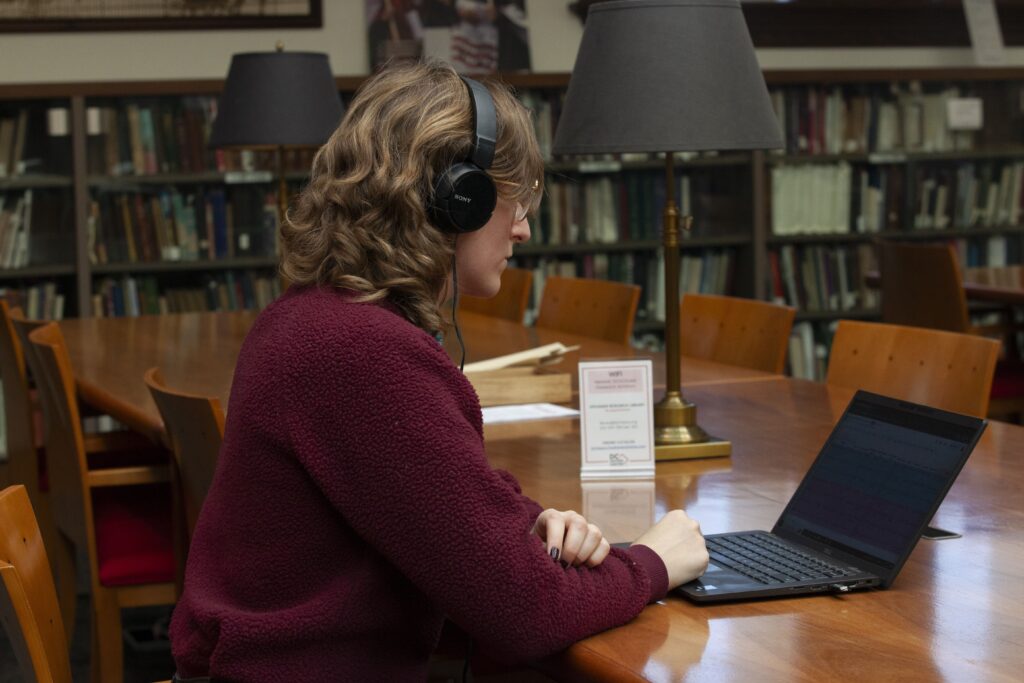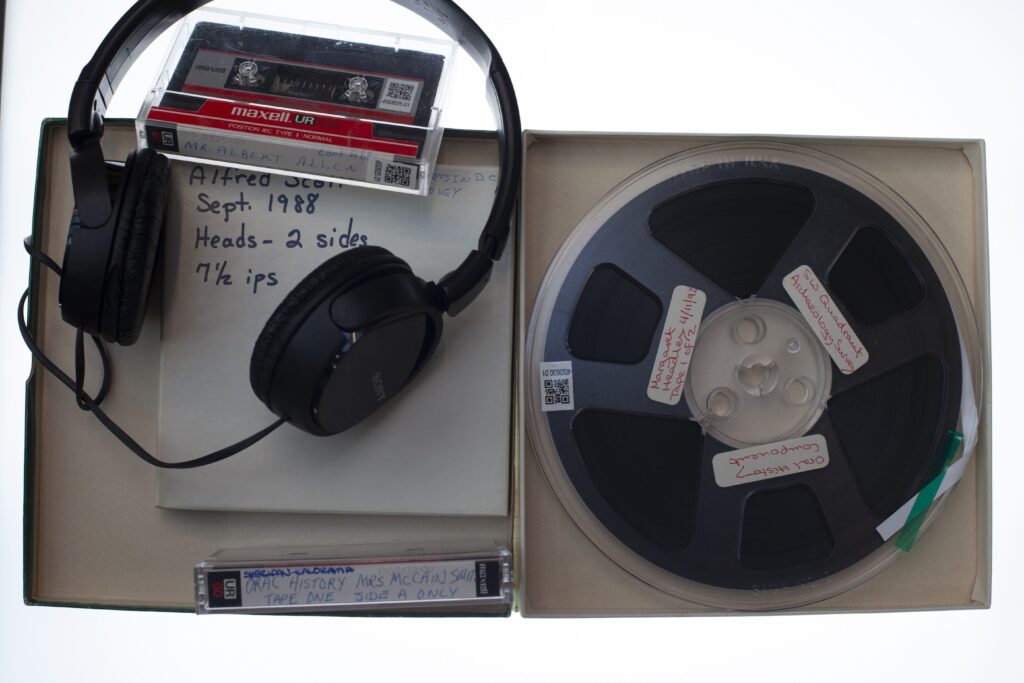Hidden within the winding collections spaces at the Carnegie Library are boxes packed with cassette tapes and reels of oral history projects. Recorded in living rooms, kitchens, and front parlors, these interviews overflow with personality, vibrantly alive. However, many of their stories remained unheard. One of my first duties as the DC History Center’s collections manager was to ensure their long-term preservation and increase researcher access by digitizing these materials. After a year of coordination and collaboration, I am thrilled to announce the completion of this project.
In partnership with the Smith Center for the Digitization and Curation of African American History at the National Museum of African American History and Culture, the DC History Center digitized 84 oral history tapes and reels from the Blacks in the Arts (MS 0824), Neighborhood Survey (MS 0825), and Archaeological Survey of Southwest (MS 0830) collections. This project was supported by the Venable Foundation. The oral histories span 1988-1992 and focus on Black Washington, covering the art and theater scene, neighborhoods like Sheridan-Kalorama, Anacostia-Barry Farms, Blagden Alley, and Southwest DC. Through these newly reformatted oral histories, Washingtonians tell their stories in their own words and with their own voice.

A Year in the Making – Project Plan Overview
- Created Statement of Work (SOW) in partnership with the Smith Center
- Participated at NMAAHC Anniversary Week roundtable discussion and discussed digitization project with peer institutions.
- The Smith Center produced Request for Quote (RFQ) and solicited vendors.
- Selected Preserve South as contract vendor.
- Packed collections materials and shipped to Preserve South facilities.
- Preserve South digitized materials and created metadata spreadsheet.
- Access and Master copies of audio files delivered on hard drive to DC History Center.
- Quality Control began, thirty day deadline for completion.
- Reconciled any discrepancies found during Quality Control with Preserve South
- Preserve South returned the materials, and the contract was complete.
- Updated public on the newly available material!
Listening Closely
Oral histories are fundamentally intergenerational work built on relationships developed with intention. The tapes range in clarity and interview styles, and many of the narrators are community elders. Although their approaches differed, each interviewer established trust with their narrator through casual and open conversation, sometimes even inserting details about their own lives. Between moments of shared laughter and connection, narrators reminisce about the rise of Howard Theatre, daily life in Blagden Alley, and Black church communities in Southwest.
In my listening, I found there was so much more to be learned from the tapes than just their narrative content. Feedback and sound quality issues due to a single stationary microphone all lent a lush texture to each interview. Failing batteries on recording devices sometimes resulted in comically sped up dialogue. Ambient noise revealed unnamed relatives and friends present in the room, sometimes even chiming in at the narrator’s request. These mechanical and practical imperfections are not errors but records of a moment in time. Each tape possesses its own unique terroir.
I was frequently drawn into the tales that the narrators spun of a different DC. Abandoning my regular business as collections manager, I heard Washingtonians gossip about neighbors and remember long gone local businesses. In one memorable listening session, I was delighted to discover narrator Edith Morganstein glowingly describing a place that had felt like “a second home” to her. My interest piqued, I listened closely to her description of a beautiful white marble library in the city center, the very building where I was listening to her words. For a moment, I felt I was with her in that space. Time suddenly nonlinear, past and present layering like thin parchment.

Quality Control with Friends
I was not alone in my listening journey. In order to confirm the quality of 226 individual audio files, I called in a dedicated Quality Control Team of volunteers to assess each audio file for clarity and completeness. We came together over our love of history and the mysterious promise of being some of the first to hear these stories, before they became publicly available. Over the next few weeks, we found moments in our days to immerse ourselves in these new-to-us stories. Nestled in our headphones, we spot-checked our assigned files, listening for scrambled audio, or abrupt ends to recordings, and confirming metadata accuracy.
Quality Control team member and DC History Center board member Harold Closter reflects on his experience:
“Working with the DC History Center’s newly digitized oral history collections was an important reminder that the history of our nation’s capital lies not only in monuments, museums, and the structures of government, but also in the hearts, minds and memories of everyday people.” – Harold Closter
Final Thoughts
This undertaking represented the intersection of many narratives. Those on the tapes, those of my fellow collaborators, and my own. As collections and project manager, I contended with the challenge of balancing speed and quality in a project with many moving parts and multiple partners to coordinate. Available for the public to hear at last, these oral histories invite us to enter the spaces captured within their reels and learn from the inhabitants embodied there. For a brief moment inside that room, we can explore the shifting landscape of Washington, DC through the spoken narratives of memory makers and memory keepers.
This project represents many career firsts for me, and its completion has spanned the entire first year of my tenure at the DC History Center. I want to express my deep gratitude for everyone who supported and contributed to this project, past and present especially my friends at the Smith Center, the digital wizards at Preserve South, the DC Africana Archives Project, the Venable Foundation, my wonderful Quality Control Team, and every narrator and interviewer within these tapes. Preserving history involves all of us; thank you for taking this journey.
If you’re looking to get started in your oral history practice or want to join a community of oral historians to talk about practice, join us for the DC Oral History Collaborative Meet-ups, hosted by the DC History Center. For those interested in pursuing their own oral history projects, HumanitiesDC offers free annual oral history workshops to DC residents, and other resources.
The DC Blacks in the Arts (MS 0824), Neighborhoods Survey (MS 0825), and the Archaeological Survey of the Southwest Quadrant (MS 0830) oral history collections are available for reference at the Kiplinger Research Library, by appointment. Initial processing of these collections was supported by the DC Africana Archives Project through a grant initiative with the George Washington University Libraries, supported by the Council on Library and Information Resources.
This project was supported by the Venable Foundation.
Autumn Kalikin is the Senior Manager of Collections at the DC History Center.